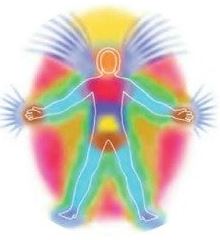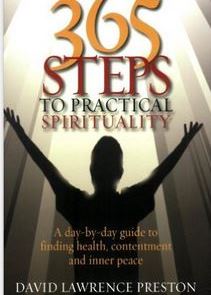There’s a story of an anxious philosophy student who goes to see his professor. ‘Please Sir,’ he asks, ‘I’ve got a question that’s eating me alive. I must find the answer. Do I exist?’
The professor turns to him with a withering look and replies, ‘Who wants to know?’
The yearning to discover our true nature is universal. Many regard this as such an impossible question, they ignore it altogether, but others recognise that when one knows the true nature of this ‘I’, they find a potent source of freedom and potential.
So who do you think you are? A body? A mind? Your feelings? If not – who and what are you?
You are not your body
One morning, I knock on my son’s door. ‘Are you up?’
A loud groan, then, ‘My body’s up, but I’m not!’ Is this a figure of speech, or does it reflect something more significant?
When you look in the mirror, who is doing the looking? Are you a collection of organs, muscles and bones covered in skin, an animal that has somehow learned how to think? You are physiologically very similar to some other higher mammals. No – your body is not what you are. You even refer to it as ‘mine’.
You are not your body because:
It constantly changes
You are born into a tiny, helpless body. It grows, matures, ages and dies – but your sense of self goes on.
With every breath, you inhale and exhale an astonishing ten thousand billion atoms from the environment – each one modifying your physical make-up. The cells in your body are constantly replaced. You grow a new skin every month and a new liver every two months. Your skeleton, which appears so solid and permanent, regenerates every three months. So do your muscles. You grow a complete new brain every year: yes, even the brain cells, where the memories, intelligence and knowledge are stored, are constantly replaced.
- The ‘I’ remains intact
How long is it since you last rode a bicycle? If it’s more than one year ago, the body that cycled is now no more, and yet within a few seconds of sitting on the saddle, you’re as proficient as you ever were. Your old body died cell by cell – but your consciousness lives on.
Individuals suffer the most horrendous injuries, yet the ‘I’ remains intact. Thousands of serious accident victims continue to enjoy a high quality of life, their sense of ‘I’ undiminished.
Imagine: if your arms and legs were chopped off, would you still feel the same sense of ‘I’? Of course you would, because even when your body is completely paralysed you remain a fully self-conscious being.
3. The ‘I’ is always there
Even when you are completely unaware of the body, e.g. under general anaesthetic, in a coma, in a deep sleep, or when you are knocked unconscious, the ‘I’ is still there observing.
Have you ever been with someone as they die? One moment, their body had life, the next it had not. And yet, although they were gone, their body was still there, exactly as it was a few seconds before, no lighter, no heavier, but completely lifeless. Whatever it is that kept them alive had gone.
4. Brain activity is an effect, not a cause
The brain is where our choices are executed, but in itself it has no power to choose. Scientists can identify which part of the brain reflects specific operations, like rational thinking, motor functions, memory and emotional responses – but they have not been able to find what causes it to happen.
Are You Your Mind?
Your mind, unlike the brain, is non-physical. It is the thoughts, ideas, memories and automatic regulatory systems that keep your body functioning. It can’t be seen, measured, touched or weighed. Perhaps (and this is a startling thought) it’s not in the body at all!
You are not your mind because there is something in you that is aware that and what you are thinking.
This ‘something’ is capable of understanding the need to monitor your thoughts. It can examine your thoughts and choose to accept or reject them. If the ‘I’ were just another thought or collection of thoughts, this would mean one thought is controlling another. Is this possible?
We know a great deal about the mind, and our knowledge is growing all the time. But where does this knowledge of the mind come from? Obviously it must come from somewhere other than the mind!
Thoughts come and go, but self-consciousness endures. It is possible to stop thinking (Eastern mystics become very adept at this) and yet remain conscious of the ‘I’. And insane people sometimes ‘lose their minds’ but remain self-conscious.
Are You Your Emotions?
Similarly, emotions change all the time, and some even cease altogether as we become more ’emotionally intelligent’ – but the ‘I’ goes on. Moreover, it is possible to be completely emotionless, in deep meditation for instance, yet still have a solid sense of ‘I’.
You are the Witness
The mind, body and emotions are something ‘I’ possess, which implies that the act of thinking involves the existence of a thinker and the mind is only an instrument. So who is this ‘I’?
You are that which watches the mind and body in action; the Witness, not what is witnessed.
The real nature of this ‘I’ goes beyond the limitations and capabilities of the senses. We know we cannot detect everything through our five senses. Dogs, for example, have a wider range of hearing and sense of smell than we; bats can pick up vibrations we can’t, and eagles can see much further than we. We have instruments which can detect stimuli which are out of range of our sensory equipment. It is beyond doubt that our five senses can’t be trusted to sense everything there is.
Spirit
Spirit is just a name for the Intelligence that sparks your body to life and leaves it when you die. Its existence is fully compatible with the latest findings of quantum physics. Once you discover the truth that you are a Spiritual being, you’re able to step beyond your previous limitations. How? By recognising that this is the part of you that has the power to think – in fact, this is the only power it has, and it is the power that shapes and directs our lives!
©David Lawrence Preston, 18.6.2016
Follow me on Facebook and Twitter @David_L_Preston
How to Books, 2007


Leave a Reply